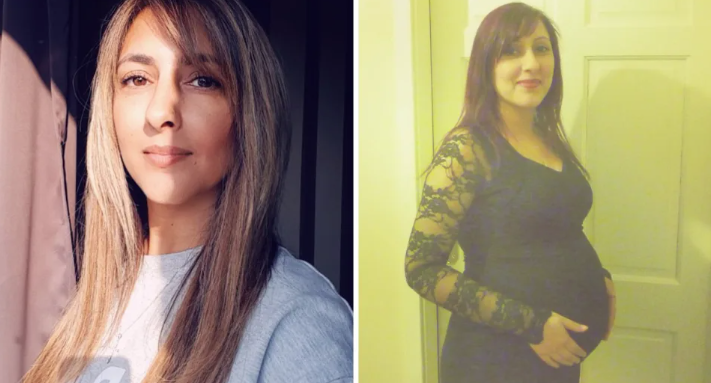Sharon Luca-Chatha (pregnant with her second son, right) has set up a charity in her first son Luca’s memory.
One mother shares her heartbreaking story of baby loss and how she is on a mission to help other mothers and fathers
Sharon Luca-Chatha, 47, experienced the ‘unbearable pain’ of her first son Luca being stillborn. Sharon lives in the West Midlands with husband Jas, 45, and their 10-year-old son Ky. Here she shares how she turned her loss into a legacy for her son that will help thousands of other parents.
As I gently placed my precious newborn son Luca in his Moses basket, I kissed his head, his little cheek and nose and told him I would always love him. “I will always keep you alive in my heart,” I whispered, taking in every minute detail of his perfect little face.
The midwife, who had been patiently waiting for the last two hours to take Luca away, finally picked up the basket and walked out of the hospital room.
As I watched her leave, I screamed: “No! No! I need him back!” My husband Jas was holding me, trying to comfort me but I was in pieces. I hadn’t had enough time to take in every little bit of our beautiful baby son and now I was never going to see him again – because Luca had been a stillbirth, born sleeping amid the cries and wails of other new babies on the labour ward.
Like thousands of parents every year we had to endure the unbearable pain of leaving the maternity ward without our baby. I remember as we drove away, looking back at the hospital and crying because Luca was still there. It didn’t feel right. I was living in a nightmare. I couldn’t believe our dreams of starting a family had shattered into so many pieces.
As I watched the midwife leave, I screamed, “No, No! I need him back!”
Pregnancy Joy
Jas and I met in 2008, set up by a mutual friend on a blind date. We clicked straight away. He was sweet, kind, shy and very from different other guys I’d met and I loved the fact he shared my passion for football. Within two years we were married.
We both had good jobs – I was a project manager and he worked as a programme manager – and we wanted to save up a little money before we had a family. But it was only four months after we started trying that I showed Jas the positive line on the test and he burst into tears of joy.
The first few months of pregnancy went smoothly although I was always exhausted. At our 20-week scan I found out the sex of the baby but Jas didn’t want to know as he thought he’d blurt it out.
I loved keeping that little secret, just me and my baby son. I barely had any morning sickness and I’d feel him moving around a lot. He was already a little football fan, kicking and moving about whenever there was a game on television.

Sharon Luca-Chatha was 36 weeks’ pregnant with her first child when she started to worry something was wrong.
Warning signs
But that’s how we first realised something was wrong. In June 2012, it was the Euros and as Jas and I sat down to watch it, I realised that our baby wasn’t kicking. I’d felt him kick that morning and he’d been jumping about the day before at a family gathering.
My husband was holding me, trying to comfort me but I was in pieces
I was 36 weeks’ pregnant so not due for another four weeks. I had a cold drink and a chocolate bar to see if that would stir him but by 10pm I decided to go to the hospital because I’d felt no movement.
As the midwife started scanning me, she complained that the machine wasn’t working and went to fetch another midwife. I saw them glance at each other and I knew straight away that something was wrong. My eyes filled with tears as they went to fetch a doctor who returned to deliver the worst possible news: “I’m sorry,” he said. And I screamed: “No! Not my baby!” as Jas fell to his knees.
We were both crying, desperate to know why, but no one could tell us. They told me that I’d need to give birth and that a natural birth would be better for me to heal physically, but knowing what I know now, I wish I’d had a C-section. The psychological scars of giving birth are still raw, even 11 years on.
Agonising grief
The doctors gave me some medication to induce the birth and sent me home. We were numb with grief. We called up family members who were as devastated as we were. I’ll never forget my mum coming round and tearfully putting her hands on my stomach and willing him to be alive. “They must have made a mistake,” she kept saying.
When I went into the hospital a day later for the birth, I hadn’t realised that I would be on a ward with other mothers giving birth to healthy babies. All around me I could hear cries of newborns. I asked them to close the door so I couldn’t hear anything.
It was as traumatic as you would expect. It took seven attempts to give me an epidural and I was in an enormous amount of pain. Luca was born in the early morning of June 21st, completely silent. As the midwife held him up, she showed him to me briefly and I thought he was utterly perfect. He looked just like my younger brother Steven.
Before the birth, I’d asked that when Luca was born, he was dressed before being handed to me so the midwife said she would clean him and bring him straight back to me. For some reason she took him out of the room to do that. Meanwhile, my placenta had not detached and I needed to head to theatre for surgery.
Trauma of separation
As I was wheeled off, I encouraged Jas to spend as much time with Luca as possible. I’d join him later. But hours later, when I returned from the operation, I found Jas red-eyed in the room where I’d left him and still no sign of Luca.
I’ll never forget my mum tearfully putting her hands on my stomach and willing him to be alive
“Where is he?” I asked, suddenly panicking. “I don’t know,” he said. “No one knows.” Apparently he’d been asking everyone where his baby was and no one could tell him. I was terrified, thinking they had lost him.
Hours later, our bereavement midwife came into the room and asked how we were doing and where Luca was. We told her we hadn’t seen him for nine hours and she was horrified. She stormed off, returning moments later with little Luca in her arms. He had been in the room next door to us all this time and no one had said anything about it. It’s still incredibly hard to this day to think of all the missed minutes and hours we lost with our little boy due to sheer incompetence.
We were placed in a bereavement suite – which is more like a hotel suite – in the hospital and many members of our families came to see him. Another failure of the hospital is that no one told me I could pick him up from the Moses basket and hold him. He had a little blood stain on his nose and for some reason, I thought that meant he was too delicate to handle.
My dad so wanted to cuddle him but I said no. So, Dad just lay his hand gently on Luca, longing to hold him. Someone should have told us we could pick Luca up and love him that day.

Sharon Luca-Chatha found being immediately separated from her stillborn baby for nine hours deeply distressing
Gone forever
That night Jas and I were allowed to stay in the bereavement suite with Luca by our side. My motherly instincts kept waking me up to check on him. But then I caught myself thinking: ‘What am I checking for? He’s gone. My baby will sleep forever.’
It was next morning that the midwife visited us again and told us we could hold him. But they would have to take him for a postmortem soon as his body would begin to deteriorate. I held them off for as long as possible. We took pictures of his beautiful face and I needed time, more time. But, after two hours we had to say our goodbyes. It was the most painful moment of our lives.
All around me I could hear cries of newborns. I asked the nurse to close the door so I couldn’t hear anything
Today, 11 years on, we think of him every single day. I’m still having counselling as two years ago I was diagnosed with unresolved Post-traumatic stress disorder (PTSD) as a result of what happened at the hospital.
We did try to go down the legal route for medical negligence – as a problem that should have been picked up on the scan wasn’t picked up – but the case was unfairly thrown out. The postmortem didn’t give us many answers and there is no guarantee that Luca would have lived if the problem had been detected. But we have never had even as much as an apology from the hospital.
It was an incredibly tough time. Within weeks of his passing, I became so depressed that I thought about taking my own life. The only thing that stopped me was the thought that Jas would find my body. Despite the joy of falling pregnant again soon after, I really struggled to move on from what happened.

Sharon Luca-Chatha set up an award-winning charity The Luca Foundation, in memory of her son who was stillborn.
Helping other grieving parents
We started locally and now we are nationwide, helping maternity units in England, Wales and Northern Ireland to all have access to CuddleCots. We recently did a survey with midwives as to how many parents were using them and sadly, many came back to say they are being used every week. There has been a four per cent increase in stillbirths in recent years and we’ve helped hundreds of families.
Only last week, I was a charity partner at an awards event in Birmingham and a lady came up to me to thank me for giving her more time with her baby. The pain of losing Luca will never leave us. We changed our surname to include him so his name will be spoken about forever and he is a huge part of our family. It’s a real comfort to know that his legacy is helping to ease the grief of others going through the most unbearable pain.
For more information or to make a donation (including Gift Aid) please visit The Luca Foundation. For further information on Baby Loss Awareness Week see Babyloss-awareness.org.
Article written by Jill Foster – Contributor, Yahoo Life Uk. Original article link here




